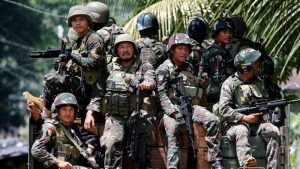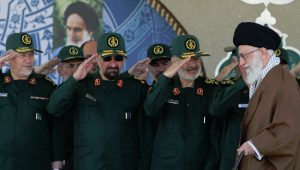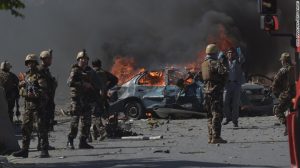ISIS’s propaganda videos are designed to cause a stir. Yet a new one released on Feb. 7 did so for unusual reasons. It showed a truck carrying women with guns, driving towards the battlefield under the ISIS flag, and then another woman, heavily armed, fighting alongside men. This is a shocking break from previous practice in the terrorist group. However, it is perhaps not entirely surprising, like reported by eurasiareview.com.
For every rule there is an exception, and as ISIS’s territory shrank over the last few months, the group was increasingly hinting that it might find some flexibility in its usual ultra-strict codes of female behavior.
But the question of women’s role in jihadist movements does not start and end with ISIS. Rather, what each jihadist group does with female fighters tells us much more about itself than it does about Islamic laws on women and war.
A Women’s Movement within ISIS?
It is firstly worth confronting some of the widespread assumptions about female jihadists. Despite the tendency in European countries to give female former jihadists more lenient sentences on the assumption that they must have been “brainwashed,” most women who join these movements know what they’re doing, and make their wishes clear.
And despite the press’s tasteless fondness for the phrase “jihadi brides,” women in jihadist movements have frequently and publicly voiced their desire to do more than marry. They want to join the fight. One of ISIS’s best-known female poets, Ahlam al-Nasr, wrote in an online essay:
“It is not possible for me to accept any kind of lifestyle except the life of jihad. I strongly desire it. I want to struggle with all types of jihad… and the jihad with weapons also. Both male and female Companions [of the Prophet] did so, so why won’t we do the same?”
This should not be taken to mean that women who join ISIS are fourth-wave feminists. They are not looking for equality with men, and are ready to embrace traditional gender roles, the duties of being a wife and mother, and obedience to their male guardian (mahram).
But, as Ahlam al-Nasr said, in the lifetime of the Prophet Muhammed and his companions, the period that jihadists see as the ideal model for society, women did engage in fighting. Umm ‘Amarah and a number of other women are said to have taken part in the Battle of Uhud, and their names remain lionized by jihadists today, including ISIS.
A Balancing Act
However, there have always been caveats on women’s participation in battle. Contemporary jihadists have a balancing act to strike. They must address their functional needs, such as the need to recruit women, who might be enticed by the prospect of fighting. However, they also need to showcase a different way of living if they are to offer a real alternative to the world they decry as sinful. For them, this alternative hangs on maintaining the traditional differences between masculine and feminine.
This balance shifts in every new phase of jihadist theology. Abdullah Azzam, the infamous Islamist cleric and founding member of Al Qaeda, is known as the “father of global jihad” for his 1984 treatise Defense of the Muslim Lands. In this text, two radical statements are made that have shaped jihadist theology since.
The first is that jihad to free occupied Muslim lands is a duty of every Muslim around the world. Freeing Palestine and Afghanistan was no longer the duty of Palestinians and Afghans alone. Every Muslim around the world was to take part. And when he said every Muslim, he meant women too. Still, Azzam’s endorsement of female fighters was limited to defensive fighting, rather than giving women an equal status on the battlefield.
ISIS’s forerunner, Al Qaeda in Iraq (AQI), was much more radical when it came to women in battle. Radicalism, in truth, was something of a trademark for its notorious leader Abu Musab al-Zarqawi. His deployment of female suicide bombers was a shock to many jihadists, and indeed a controversial line to walk.
But Zarqawi responded that if women’s participation shamed more men into joining the fight, then the move was justifiable. This wasn’t solely Zarqawi’s doing; the ranks of female bombers in AQI actually increased after his death, up until about the American withdrawal.
Integrating the Sexes: How Far Will it Go?
Why, then, has ISIS been more reluctant than its forebear to accept female help in battle? In fact, it has never issued a concrete declaration saying that women could never fight. More confusingly, it has occasionally celebrated the work of female suicide bombers.
An attack perpetrated by female “supporters” of ISIS against a police station in Mombasa, Kenya in 2016 made the front page of one of their magazines, al-Naba’. They also attempted a prisoner exchange, offering to free the captured Jordanian pilot Muath al-Kasasbeh in exchange for Sajida al-Rishawi, the woman who had attempted to blow up the Radisson Hotel in Amman on behalf of AQI, but who had been captured in the process.
Yet ultimately, ISIS was not trying to build an army, but a state, and it is for that reason that the domestic role assigned to women needed to be obsessively maintained.
Elizabeth Pearson, Associate Fellow at the Royal United Services Institute and a PhD candidate at Kings College London, has conducted studies of the role of women in ISIS propaganda. She commented to Al Bawaba:
“The State project needed men to be violent, and women to support Jihad, but primarily to be good citizens, wives and mothers of the next generation of fighters. They had to be ideologues, but not to fight. This was fundamental to the whole Caliphate project. They needed to divide male violence from women’s non-violencein order to recruit, unify and regulate the new State.”
Moreover, on the rare occasion that ISIS did celebrate female participation in suicide attacks, it provoked anxious questions about what that might mean for women’s other freedoms. Terrorism scholar Nelly Lahoud found multiple online responses to ISIS’s magazine praising the female bombers in Kenya. Male ISIS supporters were concerned about where the limits would lie for women’s participation in operations.
Patriarchy vs. Women Fighters
It seems that patriarchal concerns to control female sexuality, if they do not always trump tactical needs, remain of equal or greater importance to battlefield victories. Indeed, the fact that they are now using women in battle may have an impact on ISIS’s ability to recruit men.
Elizabeth Pearson added: “If you want male recruits to join your Caliphate as warriors, those warriors have to have the highest respect. In the strongly patriarchal culture of Jihad, the value of being a warrior would be diluted if women could do it too. For those who do not favor this move to female inclusion, Al Qaeda represents a more conservative approach in this regard, and so a possible alternative. It’s not clear how far ISIS will go with its ‘new era’, but potentially it has the power to provoke schisms, and derail ISIS’s ideology as a whole.”
So even though ISIS has never truly laid down the law against women participating in battle, they are well aware of the risks of including them. When they do celebrate women’s military efforts, they alienate men and gamble with the project of the caliphate. The ideal domestic unit is a small-scale model of the vision for an ideal society.
Upsetting that by forcing difficult questions about women in battle is extremely undesirable for the would-be state. Yet it seems the time has come. Even in this video, women’s involvement is watered down. There is an interview with a disabled man who is also fighting, but no woman speaks to the camera, which suggests that males with disabilities remain a preferable alternative for fighting than women.
Colin Clarke, a terrorism analyst at RAND Corporation, said to Al Bawaba: “What the video signals is that ISIS in Iraq and Syria feels like it must do everything it possibly can to stay relevant.Whether or not women bring an additional dimension to the battlefield, what it does accomplish is getting everyone talking about the group again.”
Even if it does spark anger and doubt among some male supporters, it may galvanize more female ones. Everything has a trade-off, and it seems ISIS is now at a point of no return. It must gamble with its core beliefs if it is to survive.












